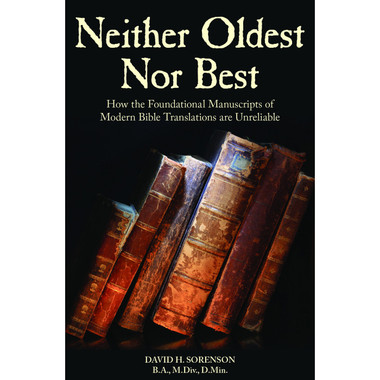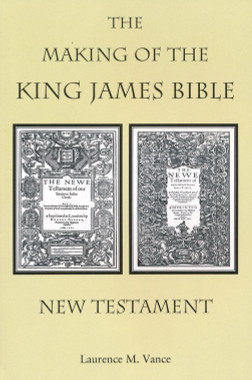Description
Author: Laurence M. Vance
The Other Side of Calvinism is the definitive treatment of the subject of Calvinism. This book provides a detailed historical examination and critical biblical analysis of the philosophical speculations and theological implications of Calvinism. Spanning over 800 pages in length, it is extensively documented from Calvinistic authorities, and presents the other side to the over 400-year-old debate over the doctrines of Calvinism. The book contains ten chapters, along with a preface, seven appendixes, footnotes, and bibliography. It is further enhanced by subject, name, and Scripture indexes.
Preface
Table of Contents
"Calvinism and the Baptists"
From the Preface:
The philosophical speculations of Calvinism, although they have been debated for hundreds of years, have masqueraded as sound Bible doctrine for much too long. The resultant theological implications, under pretense of orthodoxy, have been the dominant influence in all facets of theology. They have been accepted as authoritative, but only to the detriment of the Scriptures. The subject of Calvinism has also been fiercely debated since the time of the Reformation more than any other topic. Unlike baptism, which was the main bone of contention between the Baptists and other groups, the bitter controversy about Calvinism has infected all the various denominations at one time or another. This leavening is part of the other side of Calvinism.
So why another work on Calvinism? Although there exists an abundance of material on the subject, the overwhelming majority is from the Reformed viewpoint, which is inherently Calvinistic. The Baptist contribution to the debate comes chiefly from the Calvinistic groups. This leaves a definite void as far as a balanced treatment of the issue is concerned. The result is a disproportionate, intimidating presentation of one side which is then equated with orthodoxy. So mainly because of the sheer volume of the supporting apparatus alone, Calvinism has established a foothold on theology. This is another facet of the other side of Calvinism.
The stream of books currently available in defense of Calvinism is seemingly without end. And although it was stated a century ago by a Calvinistic theologian that "much more has been published" in opposition to than in defense of Calvinism, such is certainly not the case now. Regarding the material published opposing the Calvinistic system, whether in whole or in part, three types can be distinguished. Most of the available literature consists of small pamphlets that are inherently limited in their effectiveness. There are also some small books available from a variety of viewpoints that provide some helpful information. Concerning what could be termed the major books against Calvinism, there are at present but a few. There still exists the need for a definitive work which addresses and sufficiently answers all of the philosophical speculations and theological implications of the other side of Calvinism.
A shortage of works against Calvinism is not an adequate reason to begin an undertaking of this magnitude unless there be an important underlying cause. The salient determinant is the tremendously damaging nature of the Calvinistic system. The doctrines of Calvinism, if really believed and consistently practiced, are detrimental to evangelism, personal soul winning, prayer, preaching, and practical Christianity in general. This is even unintentionally admitted by a Calvinistic Baptist: "The doctrines taught in the Bible relating to the sovereignty of God, referred to in religious circles as 'Calvinism,' also as 'the doctrines of grace,' are doctrines of the Book that are the occasion for many people 'choking' on the Word. The misuse and abuse of these doctrines will deaden and kill." Calvinism is therefore the greatest "Christian" heresy that has ever plagued the Church. This being the case, the thesis of this book is that Calvinism is not only Reformed doctrine, and therefore something that Baptists should not be connected with, but that it is wrong doctrine. But because of its controversial nature, there exists a tremendous ignorance of the true nature of Calvinism. Some schools deem the subject so controversial that they even forbid discussion of the subject. The long and manifold influence of Calvinism on all areas of theology necessitates this examination of the other side of Calvinism.
About the Author:
Laurence M. Vance is an author, a publisher, a lecturer, a freelance writer, and the editor of the Classic Reprints series. He holds degrees in history, theology, accounting, and economics. The author of thirty-five books, he has contributed over 1,000 articles and book reviews to both secular and religious periodicals. Vance's writings have appeared in a diverse group of publications including the Ancient Baptist Journal, the Bible Review Journal, the Independent Review, the Free Market, the Journal of the Grace Evangelical Society, Future of Freedom, and the New American. His writing interests include economics, taxation, politics, government spending and corruption, theology, English Bible history, Greek grammar, and the folly of war.












